Learn everything you ever needed to know about xylitol sweetener. Is it safe? What are the benefits? All this and more are in this low-carb sugar substitute guide!
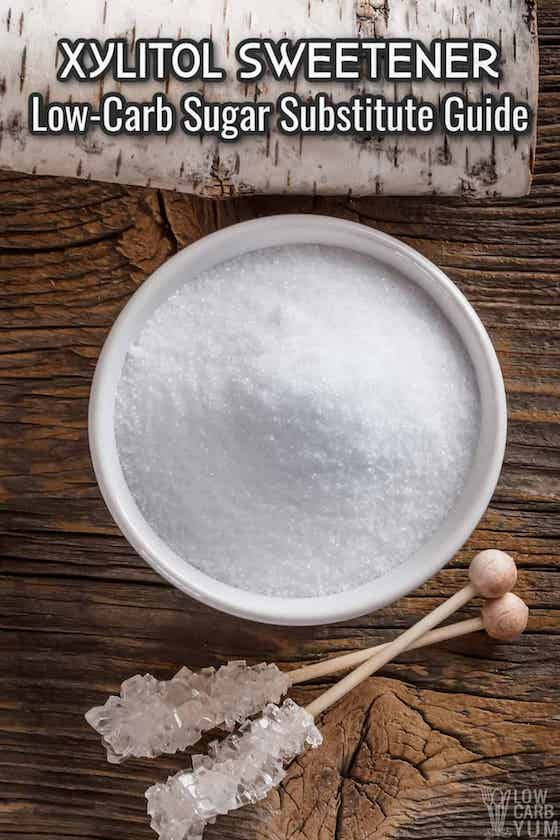
Article Index
There are a ton of different types of low-carb sugar substitutes out there. The choices can feel overwhelming. That's why I am breaking each one down in its own guide. I want to answer all of your questions about each one so you can make the best decision for yourself.
Xylitol sweetener rose to fame when it started claiming its chewing gum can reduce dental plaque. This is a huge claim and has had a lot of controversies. Studies showing that it does affect dental caries to others while others say it's not a medicine and shouldn't be used to treat a disease (cavities). It's a confusing mess.
Cavities aside, there are other reasons that I suggest you choose xylitol last as your sugar substitute.
Keep reading and learn all about this sugar alcohol so you can make your own decision.
Xylitol Sweetener: Everything You Need To Know
Xylitol is actually sugar alcohol that naturally occurs in plant material. If it is all-natural, why is it so controversial for those on the keto diet? Let's look closely at xylitol.
What Is Xylitol Sweetener Made From?
Most xylitol that you might buy or use is extracted from the bark of birch trees. It's also found in fruits and vegetables.
In fact, the word "xylitol" comes from the word "xylose," which means "wood sugar."
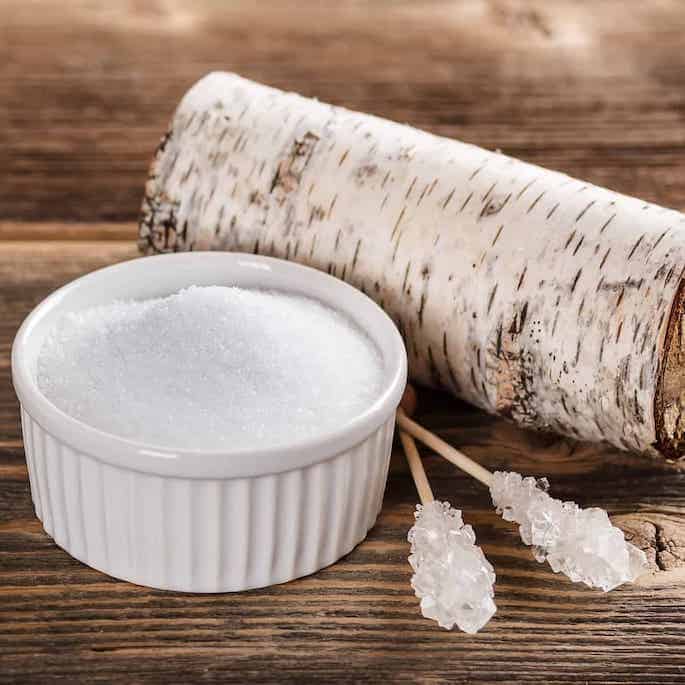
What Are Sugar Alcohols?
You know those sweeteners with the "ol" at the end - those are known as sugar alcohols. Other examples are erythritol and sorbitol. They are made by adding extra hydrogen to the sugar molecules. It's all about chemistry and how our bodies digest them.
Xylitol is a sugar alcohol, so it has that extra hydrogen in it.
How Is Xylitol Used?
It's possible to buy xylitol in powdered form and use it as a sugar substitute. It's most often used in sugar-free things like toothpaste, chewing gum, and even pharmaceuticals.
I have to tell you that it is not a no-calorie sweetener; it just has fewer calories than traditional sugar. In one gram of sugar, there are 4 calories. In one gram of xylitol, there are 2.4 calories.
Xylitol has a cooling sensation when you use it which is why most companies use it in sugar-free products that have a minty taste, such as toothpaste and chewing gum.
Xylitol Sweetener Benefits
There have been a bunch of studies showing the health benefits of xylitol. It hasn't been approved as a medicine to treat disease or health issues, but the studies do show the following benefits:
- Might accelerate ketosis. This still needs more studies because one small study of 72 people found that xylitol increased keto levels. Since it has calories, there need to be more studies to prove this before relying on it to jump-start ketosis.
- Barely spikes blood glucose. A study done on rats found that xylitol reduces the absorption of carbs when it inhibits the digestive enzymes.
- Prevents tooth decay.
- Reduces yeast infections. Another study found that xylitol reduces the ability of the yeast Candida albicans (the one known to cause yeast infections) to stick to surfaces.
- Increases collagen production. Some studies show that it could help fight the common signs of aging in your skin by increasing how much collagen your body makes.
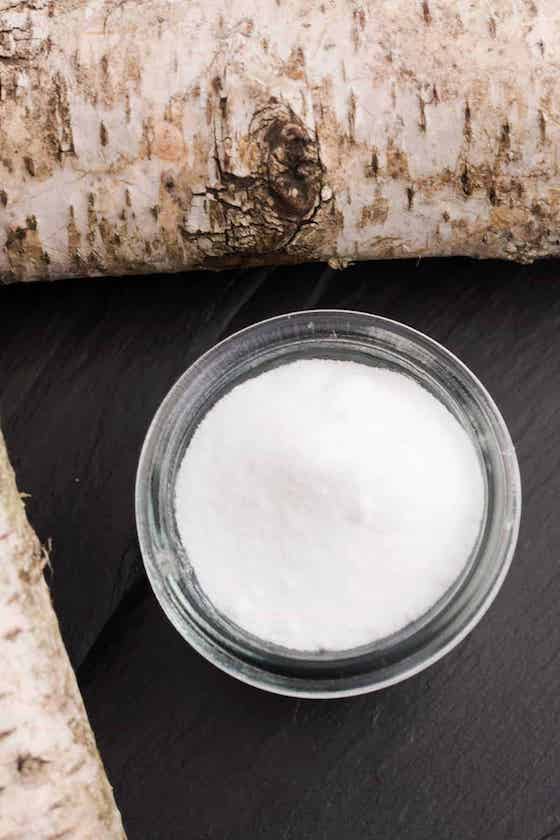
Is Xylitol Safe?
For humans, xylitol is considered safe by the FDA. However, it is toxic for dogs. If you have dogs, do not let them eat anything that has xylitol in it.
It is safe, but it is also known to give people different side effects, especially if they eat a lot of it at once.
Xylitol Side Effects
Most of the side effects people experience from xylitol come from consuming large amounts at once.
Xylitol is considered a FODMAP - fermentable oligosaccharides, disaccharides, monosaccharides, and polyols. According to Hopkins Medicine, FODMAPs are "short-chain carbohydrates (sugars) that the small intestine absorbs poorly. Some people experience digestive distress after eating them".
The most common side effects of too much xylitol are digestive issues. This is because the sugar alcohols from it pull water into the intestines or get fermented by the gut bacteria.
Common experiences are bloating, gas, and diarrhea. Most people that experience these side effects will slowly introduce their body to the xylitol and give it time to adjust to it. This helps decrease the severity of the symptoms.
To experience these side effects, you would have to ingest about 30 to 40 grams of xylitol. That is around 2 tablespoons.
Xylitol vs. Erythritol
Just like xylitol sweetener, erythritol is also found naturally in many fruits and mushrooms. The biggest difference is that erythritol does not have any calories, while xylitol does.
Research has shown that erythritol is actually better for dental health than xylitol. It's also able to be fully absorbed by our bodies - xylitol is not. So, people experience fewer digestive side effects from erythritol.
Another difference is that erythritol isn't as sweet. It is only about 70% as sweet as sugar so it's not a one-for-one sugar substitute.
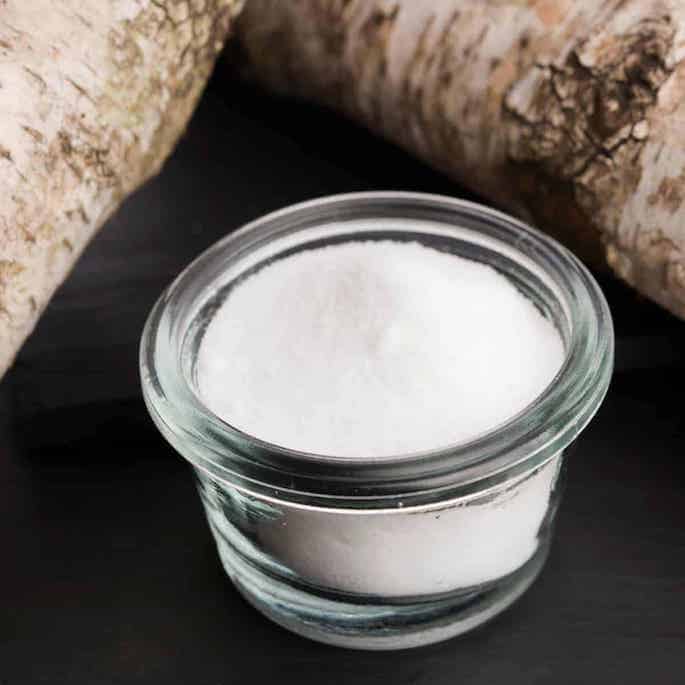
Xylitol vs. Stevia
Stevia is derived from a plant native to South America called the Stevia rebaudiana plant. The kind we find in stores in America is highly processed to make it safer and easier to digest.
Stevia is calorie-free. It also has a licorice flavor, so it isn't used very often in baking, especially in foods that won't cover up that flavor very well.
They are both sweet, but xylitol has a different taste. It has a cooling effect, which is why it is used in toothpaste and mints.
How To Use Xylitol
If you are on the keto diet, I suggest using any other sugar substitute besides xylitol sweetener. Since it has a small number of calories and carbs, it isn't the best idea for anyone trying to limit their carb intake.
The Best Recipes That Use Xylitol Sweetener
I do not recommend using xylitol as your sugar substitute of choice. But if you want to, the best recipes that use xylitol sugar-free sweeteners are low-carb desserts. Here are a few that you can try:
- Keto Granola Bars are so high in fiber that it brings the overall net carb count lower and has many amazing flavors.
- Keto Sugar-Free White Chocolate might taste pretty good with xylitol, but it won't be sugar-free anymore.
- Cranberry Swirl Cheesecake will taste really delicious with the cooling effect of the xylitol.
- Low-Carb Fresh Lemonade has such a refreshing and tart taste that the xylitol will mix in really well.
- White Chocolate Almond Bark Candy is another high-protein choice that could work with xylitol.
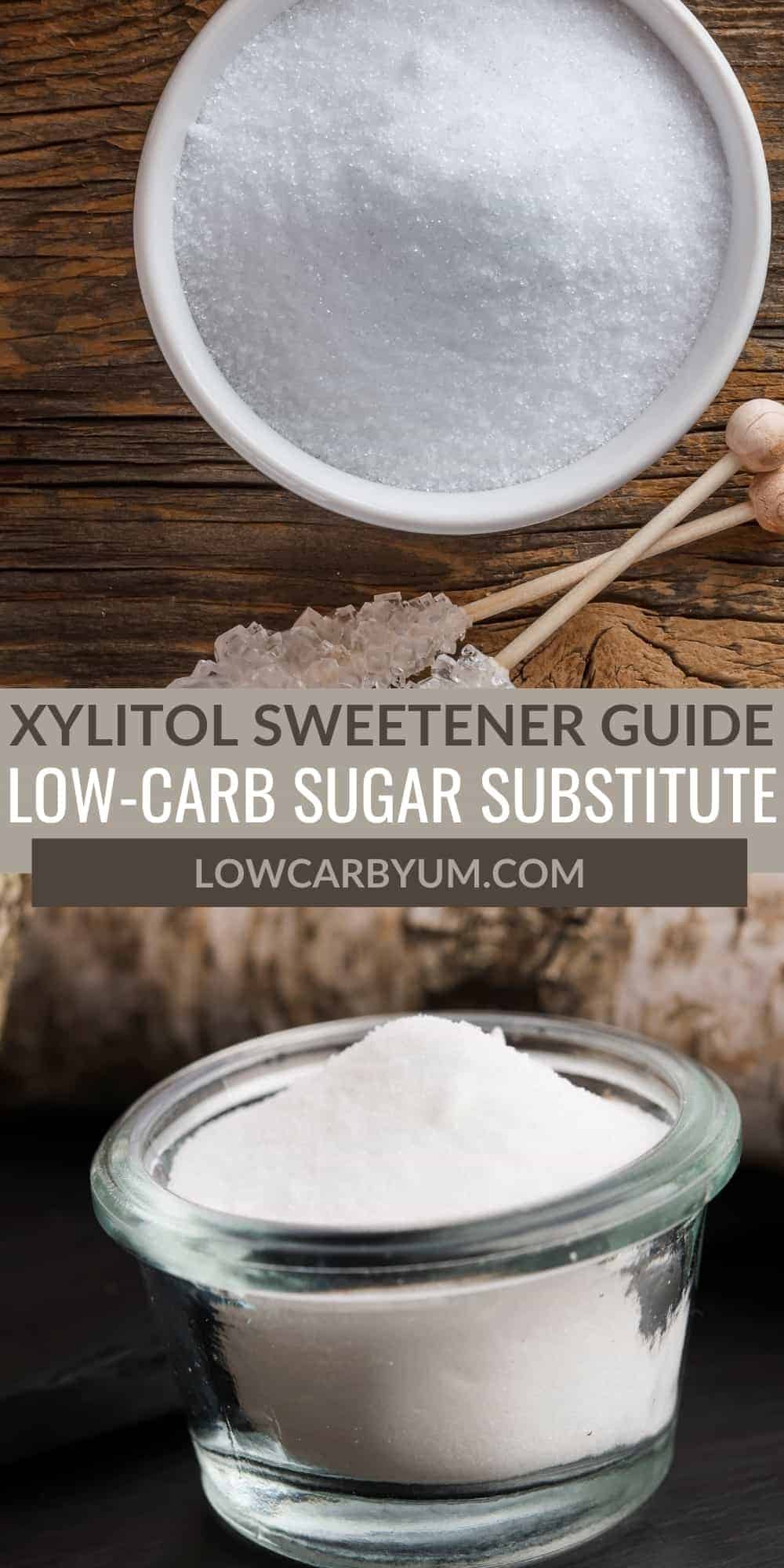
Midge
I use Xylitol to make sweet pickles. It allows the pickles to get/stay crisp. erythritol will not and will in fact crystalize on the pickles. The main thing I use Xylitol for is making sweet pickles and pickled sweet beets. Both are delicious. My sweet pickles makes great sweet pickle relish also.
Lisa MarcAurele
I didn't know xylitol worked so well for pickling. I'll keep that in mind!
Roberta
As far as I know, and from several articles I have readen about it, I have never found erythritol classified as 1:1 to sugar as you stated comparing it to xylithol... without any criticism, just to point out something that left me in doubt and quite surprised (generally erythritol is considered to be 60/70% sweet compared to sugar, so the conversion would be 1/3 erythritol more than the amount of sugar requested by a recipe).
I agree anyway that xylitol wouldn't be the best choiche for keto (not only for the small amount of carbs but above all because it seems it isn't neutral on insulin, since from scientific reports it may cause an insulin spike in some people kicking them out of ketosis; no problems seem to appear for those simply limiting carbs in a sugar-free/refined sugar-free diet, if used with a grain of salt -no pun intended).
I permit to add that a positive aspect of this sweetener, which is common only with allulose nowdays, is the softness given to cookies and pastry and the fact that it doesn't make hard-rock crystal if used for icecreams or cold sweets, even if lately it seems that adding to erythritol a pinch of something igroscopic such as inulin may counteract this crystalization limiting the side effect under your teeth.
A lat note: counteracting the growth of bacteria, xylitol also block fermentation in leavening process, so it's not good for baked goods that requires yeast fermentation since it would block the activation of the yeast itself (hope the concept results quite clear despite my bad English).
Thanks for sharing.
Lisa MarcAurele
Thank you for the additional information and pointing out the mistake on erythritol. I do state in my keto sweeteners post that erythritol is about 70% the sweetness of sugar so I'll correct that on this post.
Mary
Thank you for this great information. I look forward to reading your articles on other sugar substitutes.